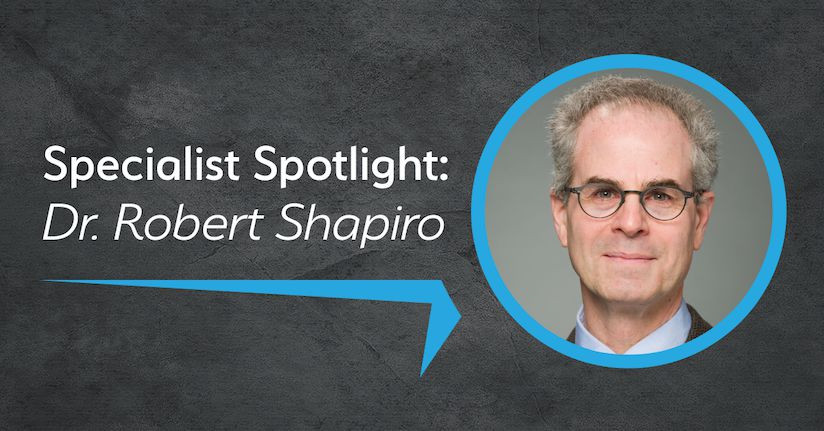Headache Specialist Spotlight: Dr. Robert Shapiro
As part of Migraine and Headache Awareness Month, we wanted to turn the spotlight on headache specialists who are leading the charge for improved migraine care and using their platform to fight public stigma. We recently chatted with Dr. Robert Shapiro, professor of neurological sciences at the University of Vermont and practicing headache specialist, to get his take on key issues within the migraine community.
Let’s get right to it. Why is migraine so much more than "just a headache?"
"I see migraine as a disease or a disorder of the nervous system with manifestations that impact many other body systems. It is more analogous to different brain states; headache is one of the symptoms that shows us that the brain is in the migraine state. There are many other symptoms that are equally valid symptoms to reflect a migraine state, and they can stand alone without headache—that does not make them any less migraine. So it is a misunderstanding to talk about a 'migraine headache' because it is not headache. It is a brain state which is often, but not always, reflected by the symptom of headache."
What are some of these non-headache symptoms that patients can experience?
"The symptoms that are most often cited, certainly in the diagnostic criteria, are sensitivity to light, sensitivity to sound, and nausea. Those are probably the three cardinal symptoms that people look for because they are helpful in guiding diagnosis. But there are other ways in which migraine shows itself commonly: sensitivity to touch, or taste, or position. This distorted sense is not just that they perceive light or sound or other things as being either heightened or enlarged, but they also can magnify the actual headache that people are experiencing at that time. People also experience vertigo and dizziness, cloudy thinking, and a wide variety of other ways the brain can conjure up symptoms as parts of particular migraine attacks."

Recently, the FDA approved new CGRP drugs for migraine. Why are patients and headache specialists so optimistic about what this means for migraine treatment?
"The approval of this new medication, Aimovig, really represents a maturation of the field. This is the first drug since 1962 that was developed specifically to prevent migraine and then approved by the FDA for that purpose. That is something to celebrate because it suggests that this is an area which is being taken seriously. Furthermore, Aimovig is also the first novel non-opioid medication approved by the FDA for any pain condition since 2004. There has been a long route for rational drug development for any pain disorder, and for migraine to be leading the way in the field of pain research is very refreshing. Right now people are trying to focus on whether or not these drugs are effective, or how well they are tolerated, or how quickly they act, but the larger context is that this is hopefully the first of several new, rationally-developed medications and therapies for migraine to become available."
In spite of recent advancements in the treatment and understanding of migraine, why do patients still face high amounts of stigma?
"The near universal experience of mild headaches has devalued the perception of disorders that are characterized by severe headaches, such as migraine or cluster headache. Others often think, 'Well they are experiencing what I have, which is mild headache, but for whatever reason they are not coping well with it.' So I suspect that the general perception of migraine is that this is largely a dysfunction of coping rather than a serious medical condition."
"It may be a reflection of the way that the word headache is used. If you go to the dictionary, you will find that there are two different ways in which headache is defined. One is a painful condition of the head, a neurological condition, and the other is varying forms of annoyance, such as 'a traffic headache.' That is, the word headache is being co-opted as a metaphor for something that is not a consequential medical problem. And the frequency of use of the metaphor is far greater than the medical condition. So if people have to come forward and say that they have a symptom which others do not regard as serious, then they immediately are compelled to hide it because there is a lack of validation."
But patients have also proven themselves capable of handling the difficulties of migraine too. Why is that?
"Patience is a very hard thing to request of people when they are in pain, but I think it is something that people with migraine often show a great ability to do because they are forced to learn this strategy as a direct consequence of the disorder. The people with chronic migraine who I take care of seem to be the most effective at multitasking their disease and their life. Finding that ability to balance and accommodate without relenting to the burden of migraine is really a necessary and valuable skill set."
Whoa! Beware! SERIOUS Aimovig disinformation!
— Robert Shapiro (@headachedoc) May 18, 2018
There is NO evidence that it's "very harmful for you (and in many cases brain degenerative)"
Safety of any new drug is only assured after years on the market.
But there is NO danger at all reported so far.https://t.co/gJQ3JdsOBK
Consequences of #migraine stigma:
— Robert Shapiro (@headachedoc) March 5, 2018
Almost 2/3 with migraine try to hide it, and almost half feel guilty about having it.
Data from @LillyMigraine marketing survey.https://t.co/iVRs5sdtYg pic.twitter.com/zX2tkrLyHj
You are leveraging your voice, particularly on social media, to fight stigma in the public arena. Why is advocacy like this so important toward improving awareness and understanding of migraine?
"We’re trying to level the playing field for people who have migraine, and anybody can gain a significant voice and be able to make a difference in this area. For our advocacy work in Washington, D.C. we started out with 45 people back when we started 11 years ago; last February, we had 145 people, and the growth has been almost entirely among patient advocates. That is really crucial because everybody who feels that they are impacted by these issues should have an opportunity to get their voice heard."
Want to get involved in the conversations about migraine and headache disorders? Click below for a comprehensive list of resources and organizations that can help
TheraSpecs Glasses for Light Management
Try our light-filtering glasses and stay protected against harsh light from screens, fluorescents, LEDs, unwanted blue light, bright sunlight, flashing lights, and more.





